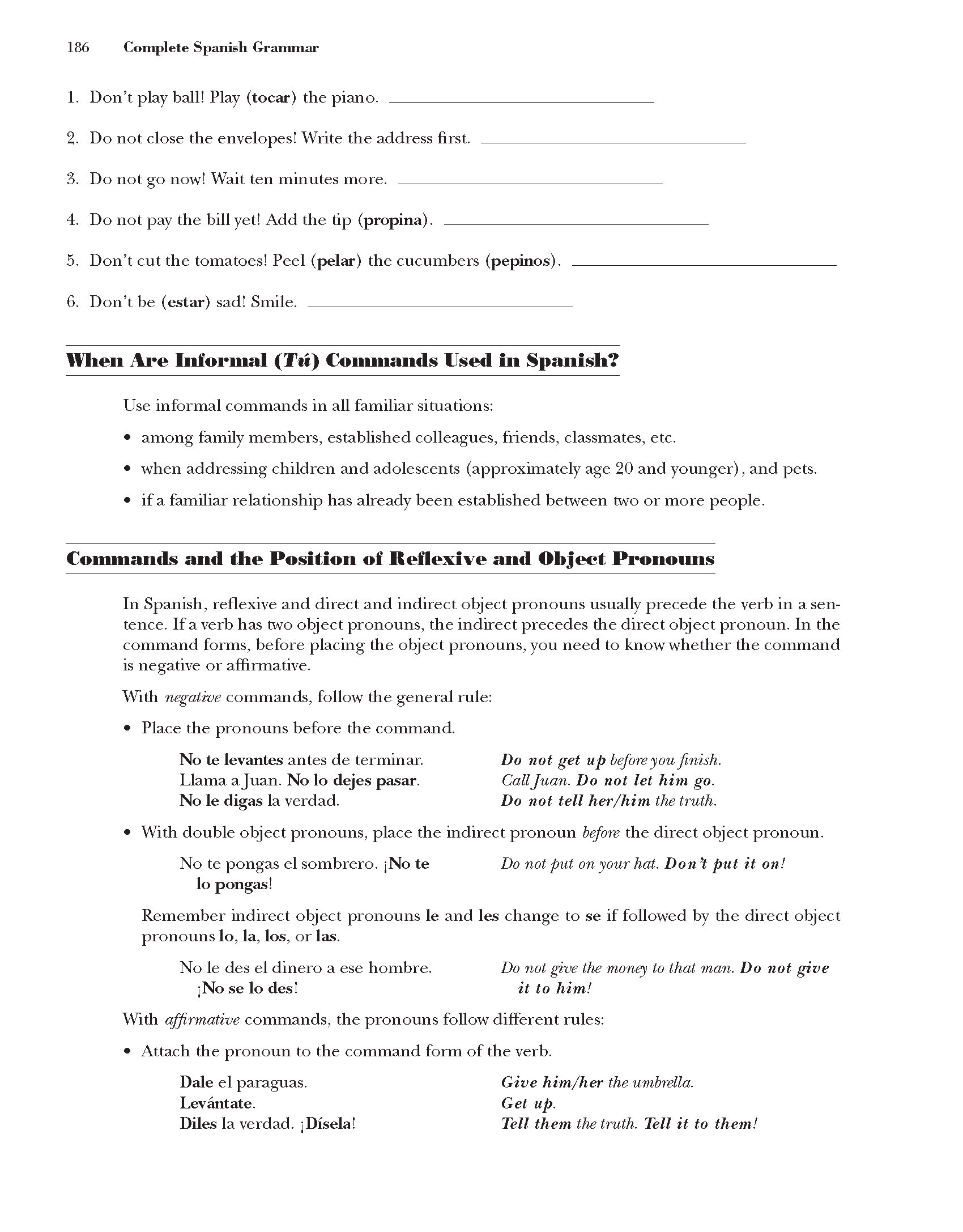CSG197

186 Complete Spanish Grammar
1. Don’t play bali! Play (tocar) the piano. _
2. Do not close the envelopes! Write the address first. _
3. Do not go now! Wait ten minutes morę. _
4. Do not pay the bill yet! Add the tip (propina). _
5. Dondcutthe tomatoes! Peel (pelar) the cucumbers (pepinos). _
6. Don’t be (estar) sad! Smile. _
Wlieii Aro Inlormal (Tu) Coiiiniands llsocl in Spanish?
Use informal commands in all familiar situations:
• among family members, established colleagues, friends, classmates, etc.
• when addressing children and adolescents (approximately age 20 and younger), and pets.
• if a familiar relationship has already been established between two or morę people.
Coiiimamls and the Position of Reflexive and Object Pronouns
In Spanish, reflexive and direct and indirect object pronouns usually precede the verb in a sen-tence. If a verb has two object pronouns, the indirect precedes the direct object pronoun. In the command forms, before placing the object pronouns, you need to know whether the command is negative or affirmative.
With negative commands, follow the generał rule:
• Place the pronouns before the command.
No te levantes antes de terminar. Do not get up before you finish.
Llama ajuan. No lo dejes pasar. Cali Juan. Do not let him go.
No le digas la verdad. Do not tell her/him the truth.
• With double object pronouns, place the indirect pronoun before the direct object pronoun.
No te pongas el sombrero. jNo te Do not put on your hat. Don’t put it on!
lo pongas!
Remember indirect object pronouns le and les change to se if followed by the direct object pronouns lo, la, los, or las.
No le des el dinero a ese hombre. Do not give the money to that man. Do not give
jNo se lo des! it to him!
With affirmative commands, the pronouns follow different rules:
• Attach the pronoun to the command form of the verb.
Dale el paraguas. Give him/her the umbrella.
Levantate. Get up.
Diles la verdad. jDiseła! Tell them the truth. Tell it to them!
Wyszukiwarka
Podobne podstrony:
CSG187 176 Complete Spanish Grammar Guarden los libros ya. Pu t the books away imm
CSG099 88 Complete Spanish GrammarThe Coiiiniands in Reflexlve Construetions In the previous example
CSG025 14 Complete Spanish Grammar My son Rob comes into the kitchen and listens to my instructions.
CSG065 54 Complete Spanish Grammar Gertain expressions of time stress the customary or repetitive na
CSG147 136 Complete Spanish Grammar 13-4ejercicio En espańol. Use the present subjunctive in the dep
CSG187 176 Complete Spanish Grammar Guarden los libros ya. Pu t the books away imm
CSG267 256 Complete Spanish Grammar 10. Where are my eyeglasses? The Long Forms Spanish also has lon
CSG309 298 Complete Spanish GrammarOther ]egative Expres$ions Some of the words you have studied in
CSG327 316 Complete Spanish Grammarejercicio Escribe en espańol. 1. Va of the popu
więcej podobnych podstron